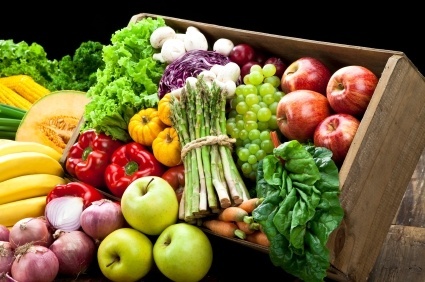Vegetables and Fruits

- Vegetables and fruits are an important part of a healthy diet, and variety is as important as quantity.
- No single fruit or vegetable provides all of the nutrients you need to be healthy. Eat plenty every day.
A diet rich in vegetables and fruits can lower blood pressure, reduce the risk of heart disease and stroke, prevent some types of cancer, lower risk of eye and digestive problems, and have a positive effect upon blood sugar, which can help keep appetite in check. Eating non-starchy vegetables and fruits like apples, pears, and green leafy vegetables may even promote weight loss. [1] Their low glycemic loads prevent blood sugar spikes that can increase hunger.
At least nine different families of fruits and vegetables exist, each with potentially hundreds of different plant compounds that are beneficial to health. Eat a variety of types and colors of produce in order to give your body the mix of nutrients it needs. This not only ensures a greater diversity of beneficial plant chemicals but also creates eye-appealing meals.

Tips to eat more vegetables and fruits each day
- Keep fruit where you can see it. Place several ready-to-eat washed whole fruits in a bowl or store chopped colorful fruits in a glass bowl in the refrigerator to tempt a sweet tooth.
- Explore the produce aisle and choose something new. Variety and color are key to a healthy diet. On most days, try to get at least one serving from each of the following categories: dark green leafy vegetables; yellow or orange fruits and vegetables; red fruits and vegetables; legumes (beans) and peas; and citrus fruits.
- Skip the potatoes. Choose other vegetables that are packed with different nutrients and more slowly digested carbohydrates.
- Make it a meal. Try cooking new recipes that include more vegetables. Salads, soups, and stir-fries are just a few ideas for increasing the number of tasty vegetables in your meals.

5 common questions about fruits and vegetables.
Have you hesitated to fill your grocery cart with colorful produce because of concerns that pop up in online articles and discussions?
Vegetables, fruits, and disease
Cardiovascular disease
There is compelling evidence that a diet rich in fruits and vegetables can lower the risk of heart disease and stroke.
- A meta-analysis of cohort studies following 469,551 participants found that a higher intake of fruits and vegetables is associated with a reduced risk of death from cardiovascular disease, with an average reduction in risk of 4% for each additional serving per day of fruit and vegetables. [2]
- The largest and longest study to date, done as part of the Harvard-based Nurses’ Health Study and Health Professionals Follow-up Study, included almost 110,000 men and women whose health and dietary habits were followed for 14 years.
- The higher the average daily intake of fruits and vegetables, the lower the chances of developing cardiovascular disease. Compared with those in the lowest category of fruit and vegetable intake (less than 1.5 servings a day), those who averaged 8 or more servings a day were 30% less likely to have had a heart attack or stroke. [3]
- Although all fruits and vegetables likely contributed to this benefit, green leafy vegetables, such as lettuce, spinach, Swiss chard, and mustard greens, were most strongly associated with decreased risk of cardiovascular disease. Cruciferous vegetables such as broccoli, cauliflower, cabbage, Brussels sprouts, bok choy, and kale; and citrus fruits such as oranges, lemons, limes, and grapefruit (and their juices) also made important contributions. [3]
- When researchers combined findings from the Harvard studies with several other long-term studies in the U.S. and Europe, and looked at coronary heart disease and stroke separately, they found a similar protective effect: Individuals who ate more than 5 servings of fruits and vegetables per day had roughly a 20% lower risk of coronary heart disease [4] and stroke, [5] compared with individuals who ate less than 3 servings per day.
Blood pressure
- The Dietary Approaches to Stop Hypertension (DASH) study[6] examined the effect on blood pressure of a diet that was rich in fruits, vegetables, and low-fat dairy products and that restricted the amount of saturated and total fat. The researchers found that people with high blood pressure who followed this diet reduced their systolic blood pressure (the upper number of a blood pressure reading) by about 11 mm Hg and their diastolic blood pressure (the lower number) by almost 6 mm Hg—as much as medications can achieve.
- A randomized trial known as the Optimal Macronutrient Intake Trial for Heart Health (OmniHeart) showed that this fruit and vegetable-rich diet lowered blood pressure even more when some of the carbohydrate was replaced with healthy unsaturated fat or protein. [7]
- In 2014 a meta-analysis of clinical trials and observational studies found that consumption of a vegetarian diet was associated with lower blood pressure. [8]
Cancer
Numerous early studies revealed what appeared to be a strong link between eating fruits and vegetables and protection against cancer. Unlike case-control studies, cohort studies, which follow large groups of initially healthy individuals for years, generally provide more reliable information than case-control studies because they don’t rely on information from the past. And, in general, data from cohort studies have not consistently shown that a diet rich in fruits and vegetables prevents cancer.
- For example, over a 14-year period in the Nurses’ Health Study and the Health Professionals Follow-up Study, men and women with the highest intake of fruits and vegetables (8+ servings a day) were just as likely to have developed cancer as those who ate the fewest daily servings (under 1.5). [3]
- A meta-analysis of cohort studies found that a higher fruit and vegetable intake did not decrease the risk of deaths from cancer. [2]
A more likely possibility is that some types of fruits and vegetables may protect against certain cancers.
- A study by Farvid and colleagues followed a Nurses’ Health Study II cohort of 90,476 premenopausal women for 22 years and found that those who ate the most fruit during adolescence (about 3 servings a day) compared with those who ate the lowest intakes (0.5 servings a day) had a 25% lower risk of developing breast cancer. There was a significant reduction in breast cancer in women who had eaten higher intakes of apples, bananas, grapes, and corn during adolescence, and oranges and kale during early adulthood. No protection was found from drinking fruit juices at younger ages. [9]
- Farvid and colleagues followed 90, 534 premenopausal women from the Nurses’ Health Study II over 20 years and found that higher fiber intakes during adolescence and early adulthood were associated with a reduced risk of breast cancer later in life. When comparing the highest and lowest fiber intakes from fruits and vegetables, women with the highest fruit fiber intake had a 12% reduced risk of breast cancer; those with the highest vegetable fiber intake had an 11% reduced risk. [10]
- After following 182,145 women in the Nurses’ Health Study I and II for 30 years, Farvid’s team also found that women who ate more than 5.5 servings of fruits and vegetables each day (especially cruciferous and yellow/orange vegetables) had an 11% lower risk of breast cancer than those who ate 2.5 or fewer servings. Vegetable intake was strongly associated with a 15% lower risk of estrogen-receptor-negative tumors for every two additional servings of vegetables eaten daily. A higher intake of fruits and vegetables was associated with a lower risk of other aggressive tumors including HER2-enriched and basal-like tumors. [11]
- A report by the World Cancer Research Fund and the American Institute for Cancer Research suggests that non-starchy vegetables—such as lettuce and other leafy greens, broccoli, bok choy, cabbage, as well as garlic, onions, and the like—and fruits “probably” protect against several types of cancers, including those of the mouth, throat, voice box, esophagus, and stomach. Fruit probably also protects against lung cancer. [12]
Specific components of fruits and vegetables may also be protective against cancer. For example:
- A line of research stemming from a finding from the Health Professionals Follow-up Study suggests that tomatoes may help protect men against prostate cancer, especially aggressive forms of it. [12] One of the pigments that give tomatoes their red hue—lycopene—could be involved in this protective effect. Although several studies other than the Health Professionals Study have also demonstrated a link between tomatoes or lycopene and prostate cancer, others have not or have found only a weak connection. [14]
- Taken as a whole, however, these studies suggest that increased consumption of tomato-based products (especially cooked tomato products) and other lycopene-containing foods may reduce the occurrence of prostate cancer. [12] Lycopene is one of several carotenoids (compounds that the body can turn into vitamin A) found in brightly colored fruits and vegetables, and research suggests that foods containing carotenoids may protect against lung, mouth, and throat cancer. [12] But more research is needed to understand the exact relationship between fruits and vegetables, carotenoids, and cancer.
Diabetes
Some research looks specifically at whether individual fruits are associated with risk of type 2 diabetes. While there isn’t an abundance of research into this area yet, preliminary results are compelling.
- A study of over 66,000 women in the Nurses’ Health Study, 85,104 women from the Nurses’ Health Study II, and 36,173 men from the Health Professionals Follow-up Study—who were free of major chronic diseases—found that greater consumption of whole fruits—especially blueberries, grapes, and apples—was associated with a lower risk of type 2 diabetes. Another important finding was that greater consumption of fruit juice was associated with a higher risk of type 2 diabetes. [15]
- Additionally a study of over 70,000 female nurses aged 38-63 years, who were free of cardiovascular disease, cancer, and diabetes, showed that consumption of green leafy vegetables and fruit was associated with a lower risk of diabetes. While not conclusive, research also indicated that consumption of fruit juices may be associated with an increased risk among women. (16)
- A study of over 2,300 Finnish men showed that vegetables and fruits, especially berries, may reduce the risk of type 2 diabetes. [17]
Weight
Data from the Nurses’ Health Studies and the Health Professional’s Follow-up Study show that women and men who increased their intakes of fruits and vegetables over a 24-year period were more likely to have lost weight than those who ate the same amount or those who decreased their intake. Berries, apples, pears, soy, and cauliflower were associated with weight loss while starchier vegetables like potatoes, corn, and peas were linked with weight gain. [1] However, keep in mind that adding more produce into the diet won’t necessarily help with weight loss unless it replaces another food, such as refined carbohydrates of white bread and crackers.
Gastrointestinal health
Fruits and vegetables contain indigestible fiber, which absorbs water and expands as it passes through the digestive system. This can calm symptoms of an irritable bowel and, by triggering regular bowel movements, can relieve or prevent constipation. [18] The bulking and softening action of insoluble fiber also decreases pressure inside the intestinal tract and may help prevent diverticulosis. [19]
Vision
Eating fruits and vegetables can also keep your eyes healthy, and may help prevent two common aging-related eye diseases—cataracts and macular degeneration—which afflict millions of Americans over age 65. [20-23] Lutein and zeaxanthin, in particular, seem to reduce risk of cataracts. [24]
References
- Bertoia ML, Mukamal KJ, Cahill LE, Hou T, Ludwig DS, Mozaffarian D, Willett WC, Hu FB, Rimm EB. Changes in intake of fruits and vegetables and weight change in United States men and women followed for up to 24 years: analysis from three prospective cohort studies. PLoS medicine. 2015 Sep 22;12(9):e1001878.
- Wang X, Ouyang Y, Liu J, Zhu M, Zhao G, Bao W, Hu FB. Fruit and vegetable consumption and mortality from all causes, cardiovascular disease, and cancer: systematic review and dose-response meta-analysis of prospective cohort studies. BMJ. 2014 Jul 29;349:g4490.
- Hung HC, Joshipura KJ, Jiang R, Hu FB, Hunter D, Smith-Warner SA, Colditz GA, Rosner B, Spiegelman D, Willett WC. Fruit and vegetable intake and risk of major chronic disease. Journal of the National Cancer Institute. 2004 Nov 3;96(21):1577-84.
- He FJ, Nowson CA, Lucas M, MacGregor GA. Increased consumption of fruit and vegetables is related to a reduced risk of coronary heart disease: meta-analysis of cohort studies. Journal of human hypertension. 2007 Sep;21(9):717.
- He FJ, Nowson CA, MacGregor GA. Fruit and vegetable consumption and stroke: meta-analysis of cohort studies. The Lancet. 2006 Jan 28;367(9507):320-6.
- Appel LJ, Moore TJ, Obarzanek E, Vollmer WM, Svetkey LP, Sacks FM, Bray GA, Vogt TM, Cutler JA, Windhauser MM, Lin PH. A clinical trial of the effects of dietary patterns on blood pressure. New England Journal of Medicine. 1997 Apr 17;336(16):1117-24.
- Appel LJ, Sacks FM, Carey VJ, Obarzanek E, Swain JF, Miller ER, Conlin PR, Erlinger TP, Rosner BA, Laranjo NM, Charleston J. Effects of protein, monounsaturated fat, and carbohydrate intake on blood pressure and serum lipids: results of the OmniHeart randomized trial. JAMA. 2005 Nov 16;294(19):2455-64.
- Yokoyama Y, Nishimura K, Barnard ND, Takegami M, Watanabe M, Sekikawa A, Okamura T, Miyamoto Y. Vegetarian diets and blood pressure: a meta-analysis. JAMA internal medicine. 2014 Apr 1;174(4):577-87.
- Farvid MS, Chen WY, Michels KB, Cho E, Willett WC, Eliassen AH. Fruit and vegetable consumption in adolescence and early adulthood and risk of breast cancer: population based cohort study. BMJ. 2016 May 11;353:i2343.
- Farvid MS, Eliassen AH, Cho E, Liao X, Chen WY, Willett WC. Dietary fiber intake in young adults and breast cancer risk. Pediatrics. 2016 Mar 1;137(3):e20151226.
- Farvid MS, Chen WY, Rosner BA, Tamimi RM, Willett WC, Eliassen AH. Fruit and vegetable consumption and breast cancer incidence: Repeated measures over 30 years of follow‐up. International journal of cancer. 2018 Jul 6.
- Wiseman M. The Second World Cancer Research Fund/American Institute for Cancer Research Expert Report. Food, Nutrition, Physical Activity, and the Prevention of Cancer: A Global Perspective: Nutrition Society and BAPEN Medical Symposium on ‘Nutrition support in cancer therapy’. Proceedings of the Nutrition Society. 2008 Aug;67(3):253-6.
- Giovannucci E, Liu Y, Platz EA, Stampfer MJ, Willett WC. Risk factors for prostate cancer incidence and progression in the health professionals follow‐up study. International journal of cancer. 2007 Oct 1;121(7):1571-8.
- Kavanaugh CJ, Trumbo PR, Ellwood KC. The US Food and Drug Administration’s evidence-based review for qualified health claims: tomatoes, lycopene, and cancer.Journal of the National Cancer Institute. 2007 Jul 18;99(14):1074-85.
- Muraki I, Imamura F, Manson JE, Hu FB, Willett WC, van Dam RM, Sun Q. Fruit consumption and risk of type 2 diabetes: results from three prospective longitudinal cohort studies. BMJ. 2013 Aug 29;347:f5001.
- Bazzano LA, Li TY, Joshipura KJ, Hu FB. Intake of fruit, vegetables, and fruit juices and risk of diabetes in women. Diabetes Care. 2008 Apr 3.
Mursu J, Virtanen JK, Tuomainen TP, Nurmi T, Voutilainen S. Intake of fruit, berries, and vegetables and risk of type 2 diabetes in Finnish men: the Kuopio Ischaemic Heart Disease Risk Factor Study–. The American journal of clinical nutrition. 2013 Nov 20;99(2):328-33.
Terms of Use
The contents of this website are for educational purposes and are not intended to offer personal medical advice. You should seek the advice of your physician or other qualified health provider with any questions you may have regarding a medical condition. Never disregard professional medical advice or delay in seeking it because of something you have read on this website. The Nutrition Source does not recommend or endorse any products.
Explore:
Use healthy oils (like olive and canola oil) for cooking, on salad, and at the table. Limit butter. Avoid trans fat.




